Audio Version Of The Blog – 9/18/23
Listen to an Audio Version of the Blog
Download:MP3 Audio

Listen to an Audio Version of the Blog
Download:MP3 Audio
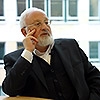 In the News (NBC News): “In making Oppenheimer, writer and director Christopher Nolan said it became apparent that the moral quandaries posed by artificial intelligence mirrors those faced by Robert Oppenheimer, whose story about developing the atomic bomb is told in the movie… .
In the News (NBC News): “In making Oppenheimer, writer and director Christopher Nolan said it became apparent that the moral quandaries posed by artificial intelligence mirrors those faced by Robert Oppenheimer, whose story about developing the atomic bomb is told in the movie… .
“As Oppenheimer developed the weapon in the early 1940s, the theoretical physicist faced backlash and uncertainty from the U.S. military and Congress, much like the tech industry is facing today in its race to make artificial intelligence more powerful, Nolan said in a recent interview… .
“‘When I talk to the leading researchers in the field of AI right now, for example, they literally refer to this as their Oppenheimer moment,’ Nolan said. ‘They’re looking to his story to say “OK, what are the responsibilities for scientists developing new technologies that may have unintended consequences?”’”
Question: Please explain why our intentions never match the results?
Answer: Because we consider ourselves good and fail to understand that our nature is inherently bad!
We think that we can mediate between ourselves, that we can be in the middle between bad and good qualities, and so on. In other words, we think that we are, in principle, not bad people. But in reality, of course, there is no one worse and more stupid than us.
We want to obtain cheap energy, we create a bomb; we want to develop medicine, we create chemical weapons, and this is how everything happens.
Question: I have a question: Where and when does the turning point occur? At what moment?
Answer: It is when a person discovers that the result of his actions will be the destruction of the beautiful future that he was building for himself. But it’s already too late.
Question: And at what point does this happen? When he suddenly sees a bomb explode in New Mexico?
Answer: Yes.
Question: And a second before that, he didn’t feel that?
Answer: He could not.
Question: Even could not? Meaning that he is suddenly shown in actuality what he did?
Answer: Yes, nothing could be done.
Question: In general, it’s a pity, a pity for Oppenheimer too, to be honest.
Answer: Certainly! A huge number of people discover the end of their good impulses, plans, and so on.
Question: If we know this, can we turn it around?
Answer: No, we don’t feel. We will be deceived a thousand more times!
Question: Even if a person hears and says, “Oh, how right he is!”, he will still go…
Answer: Yes, we don’t feel it. It has to be in faith above reason! This should be only from the perspective of Kabbalistic views on human nature.
Question: Meaning that without knowledge of human nature, simply by my decision: “I will do this— kindly,” will it not work?
Answer: No. You understand it yourself that this is not how it works.
Question: What are the actions then? How can we adjust the world a little so that our intentions coincide at least a little?
Answer: Ban it! Just forbid everyone.
Question: So now you treat the world like children?
Answer: Even worse than children. Children do not have such capabilities.
Question: It’s clear. Here the hand is in the fire, and it is necessary to hit the hand?
Answer: Yes.
Question: Simply to forbid it?
Answer: How else could this be done?
Comment: Ban the development of artificial intelligence because it will harm.
My Response: This is horrible! It is worse than an atomic bomb.
Comment: I don’t even know how to continue.
My Response: And there is nothing to continue. It is better to just ban it and that’s it. “Collect all the books, and burn them.”
Question: Okay, banned. During this period, from prohibition on, perhaps a small permission, and another small permission, what should happen?
Answer: During this period, we are obliged to educate people in faith above reason.
Question: No one will understand this phrase “faith above reason.”
Answer: It does not matter. But there is such a condition that if you want to develop exactly in a good way, without causing any harm to anyone, you must go forward and reveal nature in faith above reason.
This phrase “faith above reason” is the main, decisive cornerstone here!
If we understand how to treat nature and ourselves correctly in faith above reason, then we will do everything only good for ourselves, others, and nature.
Question: You don’t even want to explain? You want this phrase to be imprinted in a person, and that’s it. And then we’ll figure it out?
Answer: Yes. Anyway, it is hard to discern it. It takes a person years and years and years.
Question: I know that your teacher kept repeating: “Faith above reason. Faith above reason.” Even among the great sages is this phrase relevant?
Answer: Of course! Before all of us there is no other task than to climb this step, on faith above reason.
Comment: Let’s say there is knowledge that a person can do good to people, knowledge that I will be able to, and you say: “It’s all necessary…”
My Response: Not to use.
Question: And what can we believe in?
Answer: First, the very thorough and proper mastering of the method of obtaining faith above reason, and after that, already develop your toys, Oppenheimer’s and all sorts of others.
[317154]
From KabTV’s “News with Dr. Michael Laitman” 7/31/23
Related Material:
One Step before the Abyss
Will AI Enslave Us?
Will Artificial Intelligence Replace People?
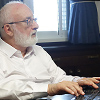 Question: How do you determine who has a point in the heart and who does not?
Question: How do you determine who has a point in the heart and who does not?
Answer: As a rule, if a person has a point in his heart, he does not leave us. He cannot leave!
But if it is still in a minimal, undeveloped form in a person, then he must somehow lead himself through several circles of development: in business, in religion, in some other society. But if this is a normal point in the heart, he will not leave us because it will not receive nutrition anywhere else.
It all depends on what the point in the heart requires, because it is the highest, most ardent desire. It requires a source of nutrition—someone who will feed it and fill its desire. A person can only find it here; therefore, he will not leave. But only a small number of people are classified as individuals with a point in their heart. In any case there cannot be many of them.
Question: How do you determine the presence of a point in the heart? Do you look at a person and understand that this one has a point in his heart and that one does not?
Answer: Yes. But this still does not mean anything because a lot depends on the person himself: the way he can realize himself, join the group, find contact with me and with the books.
[317644]
From KabTV’s “I Got a Call. Determining The Point In The Heart” 10/17/11
Related Material:
Awaken the Point in the Heart
If There Is No Point in the Heart
Unripe Point In The Heart
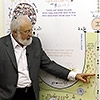 Question: By acquiring the quality of bestowal, a person begins to be filled with connection with the Creator. The part of the spiritual Partzuf in which he makes the calculation is called the head. The part into which the light enters is the body. And the part in which he cannot bestow is the lower limbs.
Question: By acquiring the quality of bestowal, a person begins to be filled with connection with the Creator. The part of the spiritual Partzuf in which he makes the calculation is called the head. The part into which the light enters is the body. And the part in which he cannot bestow is the lower limbs.
As a result, the human body in our world also looks like this, although we are talking about desires. What is the connection between the Partzufim and the worlds?
Answer: The worlds are also creations of forces that consist of certain desires: head, body, and lower limbs. Meaning, it is a collection of individual desires that combine in a certain way to impact nature.
There are five Sefirot, five Partzufim, and five worlds. They are divided into five because this is the quality of light, the quality of the force of bestowal, and the quality of the force of reception, which have the ability to connect with each other, by getting closer in five stages, which are called Keter, Hochma, Bina, Zeir Anpin, and Malchut.
Then, from the highest stage of Keter, the qualities of light gradually descend and approach the qualities of the last stage—Malchut.
[317393]
From KabTV’s “Preface to the Wisdom of Kabbalah” 8/27/23
Related Material:
The Program of Connection with the Creator
Pray And Seek A Connection With The Creator
Grasp the Connection with the Creator
 Question: How can overcoming personal hardships strengthen the ten?
Question: How can overcoming personal hardships strengthen the ten?
Answer: Personal hardships should be included in the ten; otherwise, you will not be able to escape from them.
A person has no personal hardships; they all arise only from the fact that there is no common desire in the ten to be one whole.
[317761]
From the Daily Kabbalah Lesson 8/22/23, “The need for the Creator’s salvation”
Related Material:
Examining My Inclusion In The Environment
In The Environment Of Loving Souls
The Importance Of The Right Environment
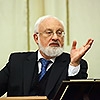 In order for the Creator’s help to be apparent, the level of revelation of evil by a person must be such that he understands that he is in a state of evil and that he has no other choice but to ask and beg the Creator to save him.
In order for the Creator’s help to be apparent, the level of revelation of evil by a person must be such that he understands that he is in a state of evil and that he has no other choice but to ask and beg the Creator to save him.
He must truly ask until all his aspirations, tears, and desires accumulate in the Creator, and then the Creator will help him.
When a person reveals the real need for true help, then he will feel that he receives it.
[317809]
From the Daily Kabbalah lesson 8/23/23, “The need for the Creator’s salvation”
Related Material:
When Does Help Come From The Creator?
The One Who Ruined Everything Will Fix Everything
The Creator Is Waiting For Your Call
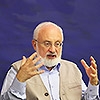 Question: Can I be happy about unity in the world even if I do not feel it?
Question: Can I be happy about unity in the world even if I do not feel it?
Answer: Try to imagine that the world is a continuous unity, and we are all in complete correction, in connection with each other in one heart.
Try it, and will see that you are already starting to feel it. Ask the Creator to make you feel it, ask to be closer to Him. And so it will gradually happen.
But the best thing is when the whole ten asks for it.
[317815]
From the Daily Kabbalah Lesson 8/23/23, “The need for the Creator’s salvation”
Related Material:
Revealing Oneness
The Future Of The World Is In Connection
The Whole Kingdom Is For Unity With The Creator!
 Michael Laitman, On Quora: “Why is the path to truth difficult? Is it necessary to seek the truth? Why?“
Michael Laitman, On Quora: “Why is the path to truth difficult? Is it necessary to seek the truth? Why?“
Finally in this dull, secluded village to find him gone. In the ramshackle hut by the fire sat true.
He had never seen a more old and ugly women.
– You – Really?
Old, wrinkled hag nodded solemnly.
– Tell me, I have to tell the world? What kind of message to convey?
Old woman spat into the fire and said:
– Tell them that I am young and beautiful! – Robert Tompkins, “In Search of Truth.”
This allegory states that we seek the truth, and if it is the truth, it can often appear as an old hag, while if it is a lie, then it seems beautiful. And so the question emerges: is it really necessary to seek the truth?
Yes, we need to seek and strive for the truth. The truth could indeed be very ugly, but it is the sole higher truth, above everything, and this makes it unique and worthwhile.
Can the truth be beautiful? If we see it as such, then it is a sign of blurry vision on our behalf, that we cannot see normally and we simply sell ourselves to it.
When, then, do we feel the truth? In order to feel the truth, we need to rise above and detach from our inborn egoistic qualities, which make us wish to enjoy for self-benefit at the expense of others and nature. We can then draw closer to the truth, discover it, and what we find would be our only truth.
Rising above our inborn egoistic qualities means rising above our ideas of ugly and beautiful, and where we will evaluate what we find enjoyable and unenjoyable according to completely different values.
In our egoistic desires, “enjoyable” is that which momentary fills us with pleasure for self-benefit alone, and “unenjoyable” is when we cannot receive the pleasure that we wish for ourselves. The different values that we can discover above our egoistic desires are the contrary: that “enjoyable” becomes the ability to give contentment to others and nature, and “unenjoyable” is that we do not or cannot give contentment to others and nature.
How, then, can we accept the truth?
We need to rise above ourselves in order to view the world from a higher level. We then need to understand what we seek, where we are and where this truth we seek should be.
Likewise, we require much courage to seek and not deviate from the path to truth. According to our egoistic nature, we run away from such a search, and we thus need to feel a certain compulsion in order to embark on the path of truth, and to stay directed at it.
And what truth do we seek?
It is the meaning of life.
We can discover, achieve, reveal, understand, evaluate and feel the meaning of life if we rise above ourselves.
What does it mean, to “rise above ourselves”? It means first that we stop evaluating everything based on our personal tastes and understandings, the myriad evaluative systems we have in our egoistic intellect and sensation.
The difficulty in achieving the truth is thus due to the need to rise above our very selves, the “I” of the person. If we fail to do so, then we will always be under the thumb of our egoistic desires, which feed us with constant lies and which hold us at an infinite distance from the truth.
Yet despite the incredible difficulty in attaining the truth, more and more people feel an attraction to it and are willing to undergo various searches and efforts in order to find it. We have to be prepared for the fact that the truth is an old ugly hag though, according to the above allegory. And we can agree to that precisely because it is the truth.
[317758]

Based on KabTV’s “News with Dr. Michael Laitman” with Kabbalist Dr. Michael Laitman and Semion Vinokur on July 17, 2023. Written/edited by students of Kabbalist Dr. Michael Laitman.
Photo by Sinitta Leunen on Unsplash.
Preparation to the Lesson
1st part of the Lesson — Writings of Rabash, “The Felons of Israel”
2nd part of the Lesson — Writings of Baal HaSulam, “General Preface”
3rd part of the Lesson — Lesson on the Topic, “Yom Kippur – The Day of Atonement”
Selected Highlights